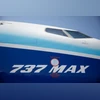Boeing asks airlines to inspect 737 MAX planes for possible loose hardware
In India three airlines -- Akasa Air, SpiceJet and Air India Express -- have B737 Max planes in their fleet
)
"The issue identified on the particular airplane has been remedied. Out of an abundance of caution, we are recommending operators inspect their 737 MAX airplanes and inform us of any findings," Boeing said in the statement. (Photo: Bloomberg)
Listen to This Article
Boeing has recommended airlines to conduct an inspection of their B737 Max fleet, after an international operator discovered a bolt with a missing nut while performing routine maintenance.
In a statement, Boeing said the issue identified on the particular airplane has been remedied.
In India three airlines -- Akasa Air, SpiceJet and Air India Express -- have B737 Max planes in their fleet.
Earlier on Thursday, the US aviation regulator, Federal Aviation Administration (FAA) issued a statement, saying it was closely monitoring "targetted inspection," of Boeing 737 Max planes for a possible loose bolt in the rudder control system.
"The issue identified on the particular airplane has been remedied. Out of an abundance of caution, we are recommending operators inspect their 737 MAX airplanes and inform us of any findings," Boeing said in the statement.
Also Read
The aircraft maker said it has informed the FAA and will continue to keep the regulator aware of the progress.
Queries sent to Akasa Air, SpiceJet and Air India Express remained unanswered.
Under consultation with it, the FAA said, Boeing has issued a Multi-Operator Message (MOM), urging operators of newer single-aisle airplanes to inspect specific tie rods that control rudder movement for possible loose hardware.
The FAA will remain in contact with Boeing and the airlines while the inspections are underway, the regulator said.
The agency is asking the airlines to work through their approved Safety Management Systems to identify whether any loose hardware has been detected previously and to provide the agency with details on how quickly these two-hour inspections can be completed.
The FAA also said it will consider additional action based on any further discovery of loose or missing hardware.
Boeing, according to the FAA, recommended the inspections after an international operator discovered a bolt with a missing nut while performing routine maintenance on a mechanism in the rudder-control linkage.
The company discovered an additional undelivered aircraft with a nut that was not properly tightened, it said.
Akasa Air spokesperson said, “We have been made aware of this issue by Boeing. Like all operators around the world, and in accordance with our highest standards of safety, Akasa will be following the same checks and procedures that the manufacturer or regulator recommends. Our operating fleet and deliveries are not impacted so far.”
More From This Section
Don't miss the most important news and views of the day. Get them on our Telegram channel
First Published: Dec 29 2023 | 10:54 PM IST
